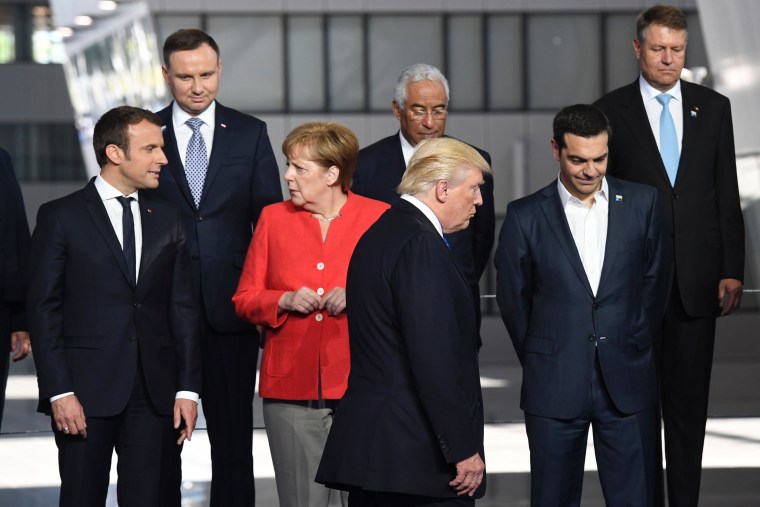In Donald Trump's White House, the president's economic, diplomatic, and national security advisers all told him new tariffs on steel and aluminum were a bad idea. Trump announced the policy anyway -- without any internal review by government lawyers or his own staff. Key officials throughout the government, including Congress, weren't consulted or notified in advance.
In fact, as Rachel noted on the show in March, Trump seemed to blurt out the specific size of the tariffs to reporters, almost as an afterthought, reinforcing the impression that the president and his team have just been winging it on an important economic policy.
And yet, the implementation of the president's policy is every bit as haphazard as the policy was formulated.
Just a few days ago, the New York Times reported that many of our key trading partners and longtime allies had no idea what Trump intended to do with regards to imposing these tariffs. The article added, "As a May 1 deadline looms, the decision on whether to grant permanent exemptions to the steel and aluminum tariffs, and to whom, appears likely to come down to the whims of President Trump."
All of which led to last night, when Trump punted.
The Trump administration said on Monday that it would delay a decision to impose steel and aluminum tariffs on the European Union, Canada and Mexico for another 30 days, giving key allies a reprieve as the White House tries to extract concessions from trading partners who have resisted those demands.The extension reflects concerns by the Trump administration of a swift retaliation on American products by European Union nations, and will also give the Trump administration more breathing room to work on a separate trade battle with China.
There's reason to believe Trump doesn't really want to implement his own tariffs policy. Rather, it's part of an apparent bluff: he wants to use the threat of tariffs to force our allies to make him happy with concessions in other areas. (This is not usually how the United States interacts with some of our closest friends on the planet.)
The result, however, is a mess. The president bragged two months ago that "trade wars are good and easy to win." It's hopefully dawned on him by now how wrong he was.
Indeed, last night's punt wasn't even the first. Vox fleshed out some of the developments since early March:
Trump had already suggested that Mexico and Canada would be temporarily exempt from tariffs set to go into effect on March 23, as the three countries work through NAFTA renegotiations. Then, as that tariff deadline loomed in March, the Trump administration extended the implementation deadline to May 1 not just for Canada and Mexico but for all the European Union countries, Australia, Argentina, Brazil, and South Korea, to facilitate possible negotiations.Now the Trump administration has pushed back that deadline once again, to June 1 for Canada, Mexico, and the European Union. The New York Times reports that Australia, Argentina, and Brazil have reached “initial agreements” with the administration that will let them at least temporarily avoid tariffs. As for South Korea, the Wall Street Journal reports that the administration has finalized a deal that will allow it to avoid tariffs altogether.
There's no reason to assume that yesterday's delay will be the last.
As for our allies in Europe, they were annoyed when the tariffs were first announced, so Trump backed off and gave them a reprieve. Last night, he did it again, but the EU is still annoyed, insisting the looming threat of tariffs that may or may not be implemented is creating "market uncertainty" that is "already affecting business decisions."
So where does that leave us? With a confused amateur president, who knows far less about trade than he thinks he does, making important decisions based on whims, while hoping to leverage economic threats against American allies.
No one has the foggiest idea what might happen next, which apparently is the way Trump likes it.
